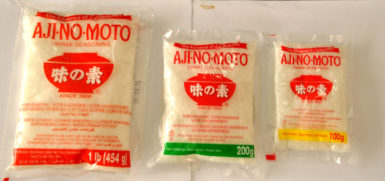In the wake of the disclosure earlier this week that quantities of monosodium glutamate with the counterfeit brand ‘Ajinomoto’ had appeared on the local market, the Government Analyst Food and Drugs Department (GA-FDD) has told this newspaper that the inherent operational weaknesses of the department pose an ever present risk that counterfeited/fake foods could have easy passage into the country.
Stabroek Business yesterday confirmed that local company Continental Agencies Ltd had lodged a complaint with the GA-FDD regarding the importation of a fake product into the country branded ‘Ajinomoto’ and believed to be manufactured in Turkey. This newspaper has also seen a document sent to the GA-FDD by a Brazilian company styling itself Ajinomoto Do Brasil Industria E Commercio De Alimentos Ltda, claiming exclusive rights to all intellectual property related to the trademark Ajinomoto and alleging the copying and reproduction of the trademark “in packaging of pure monosodium glutamate.”
Earlier this week, the GA-FDD issued a statement alluding to a disclosure “that quantities of counterfeited Ajinomoto, had appeared on the local market,” and that the product was being traded “particularly in outlying in outlying areas.” The department also confirmed that the original product is manufactured in Brazil and the Continental Agencies Ltd is the official distributor of the product. The release also referred to what it said were “noticeable differences between the original and the counterfeited Ajinomoto’s label and colour.”

On Tuesday GA-FDD Director Marlan Cole confirmed not only that his department has since seized and removed quantities of the counterfeited product from stalls and supermarkets in the lower East Coast area but that the operation was continuing.
The GA-FDD’s efforts to remove the product from the local market, however, are being affected by what the release said was denial of access to the premises of the suspected importer of the product. This problem, Cole told Stabroek Business, customarily arises out of what this newspaper understands is the customary transgression of Section 32 (2) of the Food and Drugs Act, which dictates that importers secure a certificate from the department clearing the article of food, drug, cosmetic or device for importation.
The GA-FDD had told this newspaper previously that what is believed to be the high level of entry into Guyana through legitimate ports of goods that do not qualify for entry is due primarily to its own resource challenges, including its lack of personnel to man the ports. While, in theory at least, the Customs and Trade Administration plays a supporting role in this regard, this newspaper understands that, in practice, the arrangement seldom works well.
The current case of the fake Ajinomoto, Stabroek Business understands, is one such case where the goods in question slipped through the certification net and was removed to the importer’s bond thereby saddling the GA-FDD with the responsibility of gaining access to the product once it had been removed from the wharf.
On Wednesday Stabroek Business spoke to another importer who said that his company also had the experience of having a legitimate product undersold by a fake one. He said he was aware of some “influential importers” who had been able to access “official help” to have goods released into their custody without the requisite certificate. “Once that happens even Food and Drugs finds it difficult to secure access to the product.”
While the GA-FDD falls under the jurisdiction of the Ministry of Public Health, interviews with senior officials of the department over the years suggest that the ministry has failed over time to provide the department with the requisite tools to do its job effectively. Complaints have ranged from charges of human resources weaknesses which have remained unresolved to the absence of effective laboratories for food testing. There have also been reports of corruption-driven scandals, including a recent one, involving importers allegedly being able influence the release of imported food items without the acquisition of a certificate from the GA-FDD.
Stabroek Business understands that the authorities are not ruling out the likelihood that the fake Ajinomoto might represent a health hazard and the release said, “Environmental Health Officers in the outlying regions will now be alerted,” to the presence on the market of the fake product. The release added that persons found deliberately offering items of food that do not meet the required standard can be prosecuted under Chapter 34:03 of the Food and Drugs Act.
With its head office based in Japan, Ajinomoto Corporation is a worldwide food and chemicals company which produces seasonings, cooking oils, microwave dinners, sweeteners and pharmaceuticals among other things. Its most famous product is monosodium glutamate, which is widely used in Asian cuisine. The Brazil-based company is one of its subsidiaries.





